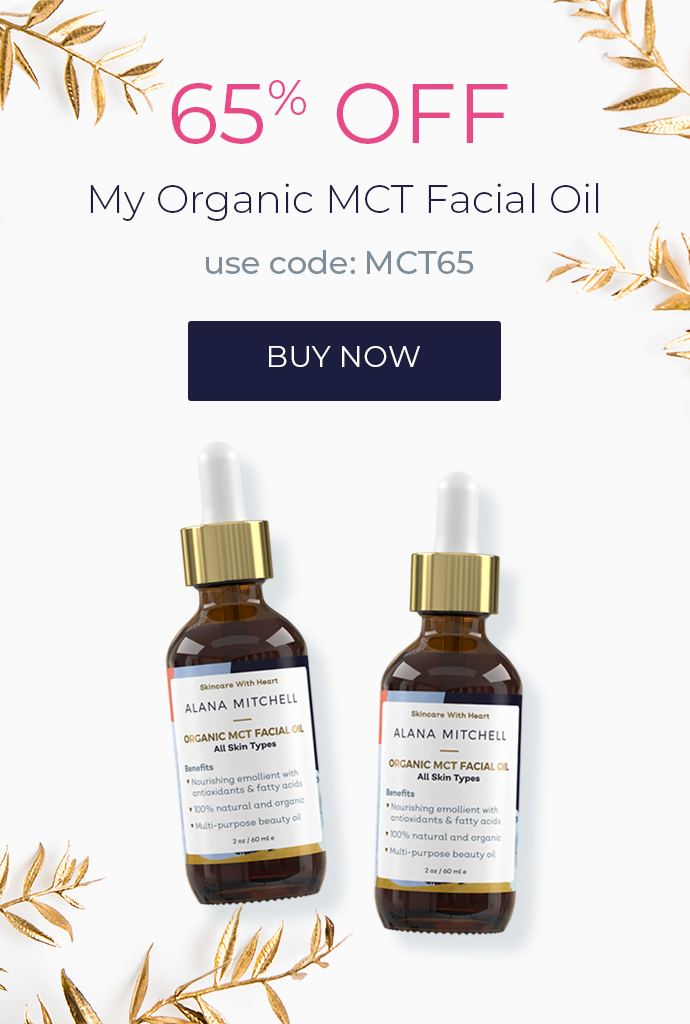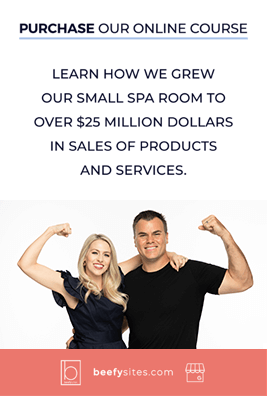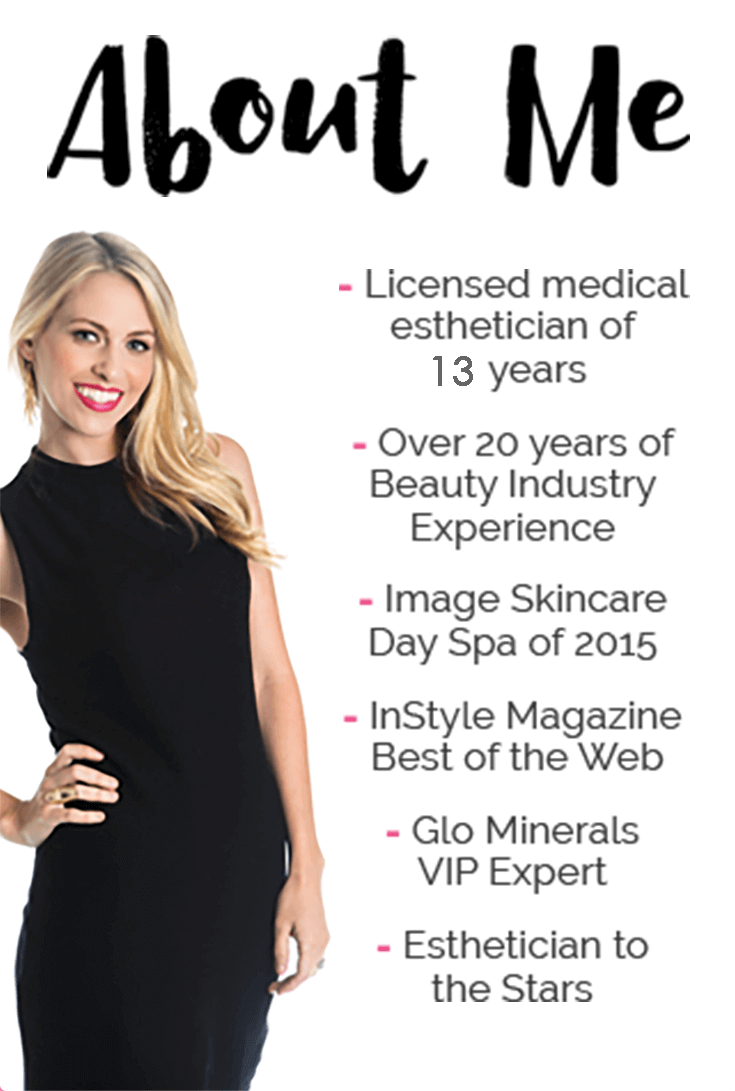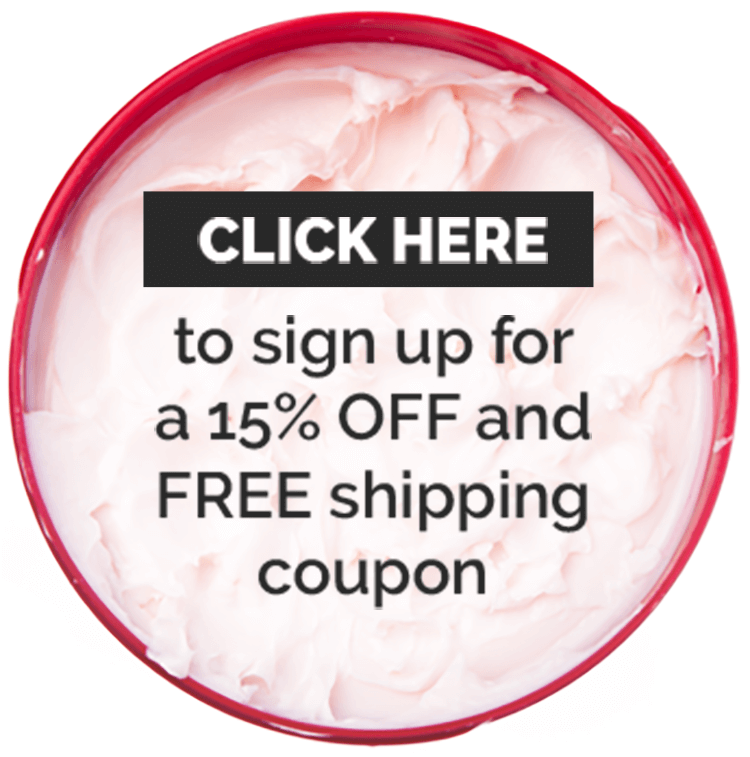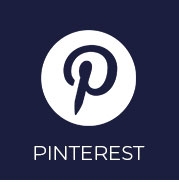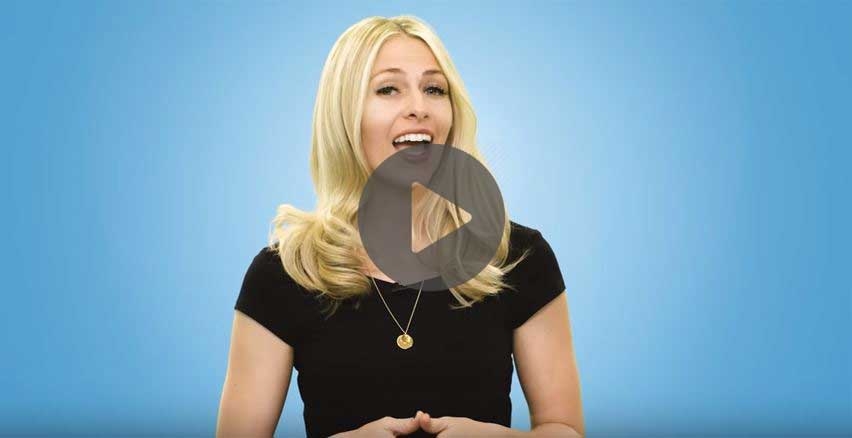What Should You Be Using In Your Skin Care Routine?
Take my quiz and get personalized recommendations from a
licensed esthetician!
The Beauty Industry Doesn't Want You to Read This
Buying beauty and skincare products from any brand should leave consumers feeling satisfied and excited - a new adventure awaits!
If you’re anything like me, trying new samples fills you with major excitement.
Come on, you know it’s so much fun!
So why does the beauty industry use advertisements and packaging that rely on fear-mongering tactics to sell their products?

Every brand creates and markets different products containing different chemicals and ingredients.
A recent survey of 4,000 women by Poshly and Stowaway Cosmetics found that the average woman owns 40 makeup products.
As consumers, marketing and advertisements tell us that there are “toxins” in our skincare that we should avoid, and that we should buy “non-toxic” products from “green” brands.
But what even are toxins, exactly?
Why does the word “toxin” invoke fear in some people?
And why are we encouraged to automatically reach for beauty products that are deemed “safe”?
Understanding “Toxins”
A toxin is considered an antigenic poison or venom derived from a plant or animal.
Toxic products are defined as harmful and poisonous and can cause serious debilitation or death in extreme cases.
Toxins shouldn’t be dismissed altogether, of course.
They exist, they’re real, and they should be treated as such.
But when it comes to the beauty industry, how toxic are certain products?
While there are some ingredients that are a legitimate cause for concern, your favorite facial cleanser isn't going to cause disease or kill you.
What’s perhaps most troubling is that companies prey on consumers with toxic terminology in their advertising.
The popularity of “green” or organic products is at an all-time high, with consumers desiring “natural” beauty solutions more than ever.
If you don’t think beauty brands aren’t strategically inciting fear of “toxins” and other “dangerous” chemicals to sell their products, think again.

The Push For “Toxin-Free” Products
Chemicals (and acids) aren't always the enemy. In fact, they're some of my favorite skincare ingredients:
- Retinol
- Alpha hydroxy acid
- Peptides
- Zinc oxide
- Hyaluronic acid
Many products do contain a mixture of chemicals in their composition.
Unless you make your own, everything from shampoo to moisturizer to body wash was most likely created thanks to a combination of chemicals.
Preservatives, in particular, get a bad rap.
However, they maintain a product's efficacy, freshness, and prevent mold and bacterial growth.
So why are we allowing ourselves to be scared of what beauty companies declare "dangerous"?

Is “Toxic-Free” Advertising Legit?
Beauty brands use buzzwords like "non-toxic," "clean," and "safe" to appeal to their existing customer base and target new consumers.
An easy way to gather consumer trust is to capitalize on current trends, like the “all-natural" wellness movement we’re seeing a lot of now.
If a brand presents itself this way, they’re more likely to appeal to the psychology of consumers who desire their products.
However, the FDA states that these buzzwords - like “organic" and "natural" - are claims that have absolutely no legal standing ground.
Beauty companies can say what they don't mean - and get away with it.
Especially when wanting to achieve the status of a “wellness brand” because they know it motivates consumers to buy, buy, buy.
An example of a true-blue, literal “all-natural” product would be a hunk of raw shea butter.
Not a body lotion “now with shea butter!”
It can be confusing and lead people to believe what they’re buying is the same thing.

Psychology and Advertising
Did you know that neuroscientists have conducted studies that revealed that only 5% of our cognitive activities, such as decisions, emotions, and actions, are conscious, whereas the remaining 95% of activities are non-conscious?
That might help explain why you naturally gravitate toward "green" beauty and skincare brands, but there's more.
Research shows when it comes to buying beauty products, consumers are driven by their emotions.
They desire more confidence and feel that the right beauty products will give it to them.
According to one study, consumer satisfaction is greatest when beauty brands help strengthen feelings of positive emotion by feeding the perception that consumers are “caring for oneself.”
What better way to “care for oneself” than by buying “wellness” products that present themselves as "safe" and "natural"?
People want to buy "safe" beauty products, myself included! It's important to know what's going in your body.
However, the bottom line is that fear-mongering in advertising is unethical, and some beauty brands take it to the extreme by presenting an “us vs. them” mentality.
Some examples:

The account above has since removed the photo because their followers found their messaging to be offensive and insensitive!



Comparing “toxic” beauty to a toxic relationship is an irresponsible comparison at best.
These types of ads are designed to guilt you into buying their product instead of the competition's, which, if you ask me, shouldn’t be the way to go.
Usually, there isn’t any substantial proof as to what makes one brand better than another in terms of “toxicity.”
C'mon, think about it - beauty and skincare companies want to stay in business and make as much money as possible.
Could any of them do this if their products were filled with toxins?

How Self-Image Plays a Role
Beauty advertisements are constantly telling us to improve ourselves.
"Take years off your face!" "Get rid of those pounds!" "Clear up your acne!"
We're constantly pushed toward the end result, rather than appreciating the skin we're currently in.
It's no wonder that approximately 91% of women are unhappy with their appearance.
According to Lisa Amans, department chair of Advertising, Fashion, and Retail Management at The Art Institute of Washington, the cosmeceuticals segment - a combination of cosmetics and pharmaceuticals - is growing at a fast rate, with "anti-aging," "organic," and "natural" products grabbing the most attention.
“Consumers expect — or hope — the products will make them look better than they did without the products,” Amans says. “And, if they are lucky, maybe these products will make them more appealing like some of the models who advertise the products. The economy will not change that basic human emotion.”
This is why understanding the psychology behind consumer motivations is crucial.
"Dangerous Ingredients" or Effectiveness: Pick One
Here's a real-world example of an organization declaring certain ingredients as dangerous to your health and disease-causing without sufficient scientific research.
The EWG's Guide to Sunscreens and Best Sunscreens are touted as an information source about ingredient safety.
The organization claims that many of the ingredients commonly used in popular lotion and aerosol sunscreens, such as oxybenzone and retinyl palmitate, are linked to cancer, hormone disruption, and other long-term implications.
How do they determine this? Based on the label.
In my opinion, any sunscreen is better than no sunscreen.
Going sans sunscreen has a proven link to developing signs of aging and skin cancer, while any correlation between these "scary" ingredients and cancer is unknown.
Why take a chance on something that will happen vs. something that might happen?
There's also some sketchy stuff worth looking into about the EWG.
The "approved" sunscreens are sold on the EWG's website, and most of them have an "EWG Verified" seal, which they had to pay $500 for.
The EWG states that they don't give preferential treatment, but hmmm. Conflict of interest, much?
Not to mention they're using scare tactics to sell, and that cash is going directly into the EWG's pocket.
If you're truly concerned about these ingredients, ask your dermatologist or esthetician.

Biggest Offenders
While there are many chemical ingredients that don’t have scientific research to back up "toxic" claims, some - like parabens - are worth researching to determine if you want to expose your skin and body to its potential effects.
Below are some commonly-cited "questionable" ingredients:
- Phthalates are a group of chemicals used in hundreds of products like lotions, oils, nail polish, hair sprays, after-shave lotions, soaps, shampoos, and perfumes. The FDA concludes that while much is still unknown about the effect of phthalates on our health, any effects resulted from exposure are minimal in most cases.
- Sulfates are a large group of ingredients used mainly as cleansing agents in skincare and hair care products; they include sodium lauryl sulfate, ammonium lauryl sulfate, and sodium laureth sulfate. There is no known research on the effects -- if any -- of sulfates on our health.
- Parabens are synthetic preservatives used in cosmetics and personal care products such as deodorants, moisturizers, and shampoos. Parabens keep your favorite products “fresh” for months or even years in your medicine cabinet. Parabens do enter your body through your skin when you use these products. The danger presented by parabens is that they can disrupt functions of the endocrine system.
For a comprehensive list of ingredients used in U.S. products that are actually banned in other countries, keep reading!

FDA Regulations On Beauty
While the FDA doesn’t actually have to stamp beauty and skincare products with a seal of approval, it does regulate for safety.
According to the FDA website, among the products included in the definition of "cosmetics" are:
- Skin moisturizers
- Perfumes
- Lipsticks
- Fingernail polishes
- Eye and facial makeup
- Cleansing shampoos
- Permanent waves
- Hair colors
- Any substance intended for use as a component of a cosmetic product
It does not include soap.
There are concerns over the FDA’s lack of authority over the industry due to outdated laws, however (in my opinion) it’s highly unlikely that a setting powder from a popular traditional beauty brand would lead to a lethal condition for a consumer.
Interestingly, the U.S. still uses 10 ingredients in beauty and skincare products that are banned in other countries, most notably in Canada and the EU:
- Triphenyl Phosphate (TPHP): used in nail polish
- Petroleum: used in mineral oil
- Propyl paraben: used in cosmetics, skincare, and hair care
- Fragrance: used in perfume, cosmetics, skincare, and hair care
- Hydroquinone: used in facial lighteners and brighteners
- Phthalates: used in perfume, cosmetics, skincare, and hair care
- Phenylenediamine: used in dark hair dye
- Avobenzone: used in chemical sunscreens
- Oxybenzone: used in chemical sunscreens
- Formaldehyde: used in nail polish, hair straightening treatments, and eyelash glue
So why do we use these ingredients when they're deemed too dangerous for public consumption elsewhere?
Good question.
When these ingredients are used in the correct way (i.e. following the recommended directions), then they’re not considered to be “harmful” in terms of FDA regulation.
So basically, the amount of chemicals found in our favorite products shouldn’t be dangerous to our health if we’re using the products for their intended purpose.

Have No Fear
Now that you can recognize fear-mongering tactics, you can approach beauty and skincare products with an expert eye.
And hey, I'm here to help you out!
I’ve been part of the beauty industry for most of my life, and as a licensed esthetician, I work with hundreds of product lines every day.
I’ve seen plenty of advertising and sales trends that drive people to spend their money on certain products.
I wholeheartedly believe if a product works, you shouldn’t need to incite fear in order to sell it.
You shouldn’t be afraid of “toxins.”
Heck, even oxygen is a chemical!
Don’t fall victim to fear-mongering.
Recognize when advertising terminology has negative connotations, and ask yourself, “Is this product really safe? Is it less harmful than other products?”
Do your own research and come up with your own conclusions - don’t let brands do it for you.
You should feel safe and confident in what you buy, which is why I’m sharing this information with you.
I carefully crafted each product in my own skincare line with hand-selected ingredients that I believe in.
I’ve used them and appreciate what they do for my skin - some products are all-natural, some organic, and some with chemical properties.
I like to embrace positivity and help my clients feel comfortable and safe.
Fear-mongering is not a practice I engage in.
Final Thoughts
It’s important to acknowledge that while FDA regulations are put in place to keep us safe, they’re hardly foolproof.
The next time you’re shopping online or at a store, watching TV, or reading certain advertisements, stop.
See if you recognize harmful jargon or if you’re swayed by certain buzzwords.
Ask yourself why and gauge your emotions - do you feel scared (and therefore motivated) to buy certain beauty and skincare products?
That’s why doing your homework is so important!
Being well-informed can keep you safe and helps you avoid being taken advantage of by unethical marketing and advertising tactics.
Remember, most products touting themselves as "green" or "natural" won’t directly advertise against conventional beauty brands at your favorite beauty stores (think Ulta, Sephora, or your favorite drugstore) because they’d face lawsuits and it would almost certainly be bad for business.
They’ll amp up their own "natural" advertising instead.
Simply put, these tactics are strategically put in place to encourage consumers to fear "toxins" and chemicals, which is not always something we need to do.
Remember: We have the power to choose what we use based on our own insight and knowledge.
Don’t be afraid to question your motives for buying what you buy!
Are you more inclined to purchase products with a “non-toxic” or “all-natural” label? Let us know why or why not in the comments!
Top Brands
New Brands
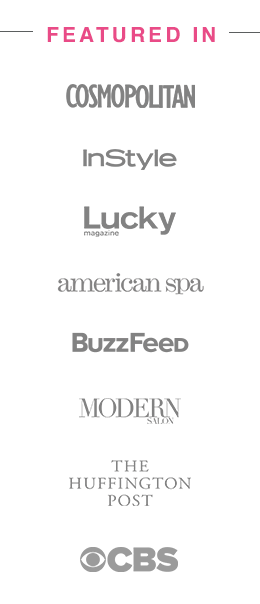
Recent Posts
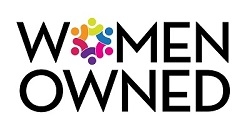
Are You Taking the Right Steps to Care for Your Skin?
Take the Quiz
Skincare Secrets!
10-step guide for healthy, beautiful skin after kids.
100% privacy. I will never spam you!


